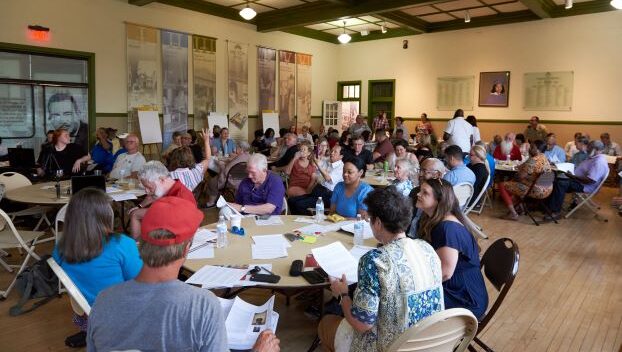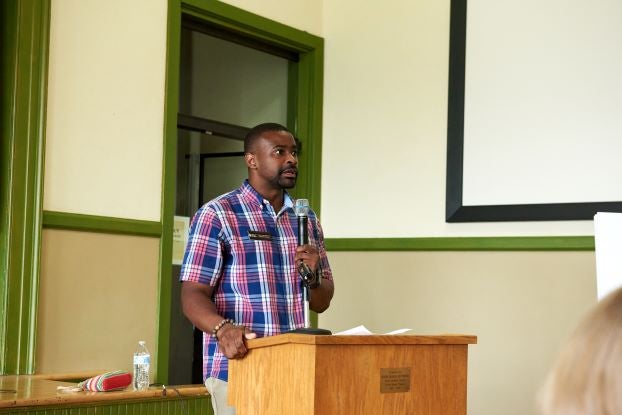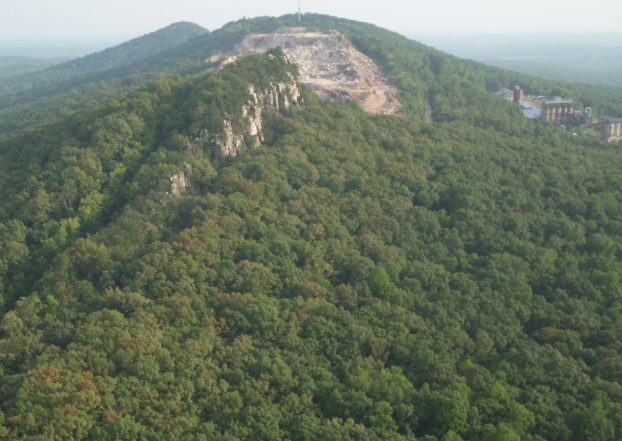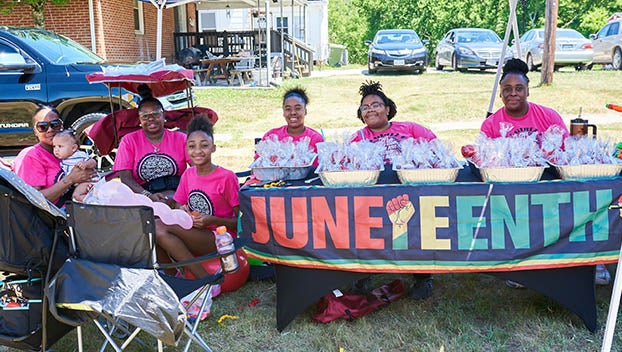What should happen to Israel Hill? STEPS holds town meeting
Published 5:44 am Saturday, June 8, 2024

- Farmville residents came out to hear a presentation and give their input about what should happen to the Israel Hill property. Herald photo by Connor Thompson.
|
Getting your Trinity Audio player ready...
|
Some want to focus on history. Others want to set up something to benefit future generations. And a handful of folks were there to learn how the town would protect their property values. The Moton Museum was packed Tuesday night, as residents gave their ideas about what should happen to the property formerly known as Israel Hill.
As we reported late last month, STEPS is looking for property to build what’s known as ‘supportive housing’ for the homeless. And to do that, they’re focused on 48 acres of land just off Layne Street in Farmville, on the west side of town. Under the plan, STEPS would buy the property. Then its partner, Virginia Supportive Housing (VSH) plans to build apartments on a portion of the land. But before moving forward, the groups wanted to hear what Farmville residents had to say, as far as what they wanted to see done with the rest of the 48 acres once the housing is built.
That was the purpose of Tuesday’s community meeting, to present information and then hear what residents had to say. And there was a lot of information to share. For the first 40 minutes, residents heard from STEPS, Moton and VSH officials about everything from the history of the property to current estimated costs.
The current Israel Hill plan
VSH’s executive director Allison Bogdanovic explained what the housing part of the project would look like, as well as what ‘supportive housing’ means in this case. This would involve building an apartment complex, at a cost of an estimated $24 million. The apartments will have a full kitchen and bathroom and essentially look like any other facility.
“This isn’t a shelter,” Bogdanovic said. “They will have their own kitchen, they’re cooking for themselves. That’s what people want, the dignity of their own apartment. They have a lease. They pay rent.”
Yes, supportive housing is designed as affordable housing to help get homeless individuals and families off the streets. But it’s a bit more than that. The concept also offers services to help homeless residents get back on their feet. We’re talking about case management, working with individuals to help them deal with things like appointment scheduling and planning ahead for rent payments. It also involves job and life skills training, so that residents understand things like time management, cooking and budgeting.
Bogdanovic said out of the 155 staff members at VSH, 60 of those are social workers. They’re in the buildings every day, helping residents work to get their GED or assist with getting disability.
“We don’t say to folks you have to have a job before you move in,” Bogdanovic said. “We’re gonna deal with your basic needs first. We’re gonna take away the fear of where you’re gonna sleep tonight first.”
As far as results go, the numbers show it works. A total of 95% of people who go into a VSH property like this do not return to being homeless.
Before COVID, Bogdanovic said, people stayed about 4 and a half years on average in the community, before getting back on their feet. Now that’s up to 6 and a half years, as the pandemic years were hard on a number of people financially.
Crunching numbers
Currently, VSH has 12 communities like the one proposed, spread out from Charlottesville to Virginia Beach. They have a real estate team that helps put a project together. And then they have a property management group, which runs the operation just like any other apartment complex.
Now comes the second question. How’s this being paid for? Currently the group has $825,000, which will go to the land purchase and any left over for construction costs. That leaves just over $23 million still to be acquired.
“What we want to do is go out there and get as much federal and state money as we can,” Bogdanovic said.

Moton Museum Director Cainan Townsend gives a presentation on Israel Hill’s background. Herald photo by Connor Thompson.
Looking at history of Israel Hill
Israel Hill remains a unique part of Prince Edward County’s history. It was settled in 1810 by 90 former slaves who had been granted both their freedom and 350 acres. According to Moton Museum executive director Cainan Townsend, it was called Israel Hill because the residents treated it like their promised land. And in turn, they called themselves Israelities.
William and Mary professor Melvin Ely, who wrote the book “Israel on the Appomattox” about the subject, writes that the slaves had been freed by Judith Randolph, after the death of her husband, Richard Randolph. Richard, Ely wrote, had ordered the slaves be freed in his will. His will was written in 1795 and even though Richard died in 1796, Judith took more than a decade to free the slaves and give the land.
But once Israel Hill got started, it grew quickly. Ely writes that its residents established farms near the banks of the Appomattox River and became entrepreneurs in the area.
“Free blacks and whites did business with one another, sued each other, worked side by side for equal wages, joined forces to found a Baptist congregation, moved west together, and occasionally settled down as man and wife,” Ely writes in his book of Israel Hill.
“You did have an example of some desegregated society working in some form or fashion,” Townsend said. “Peaceful co-existence is not accurate, but there was some level of mutual understanding. As these Israelities are doing this work, they’re business owners, they’re entrepreneurs. These were phenomenal people that created a preface of an African-American middle class that would lead to the desire of schools here.”
How to honor history
So how do you progress with the project, while also honoring the history of the property? After the presentation, residents thought for a few minutes and then started giving their ideas. There was one suggestion for historical monuments, creating a type of ‘living history’ in much smaller scale than Williamsburg but along the same lines. Other people liked the idea of a historical walking trail, giving signs throughout the path, where people could walk and learn.
The idea of naming roads after the community or individuals who lived there was brought up, but there didn’t seem to be much interest in that.
And beyond honoring the past, some residents wanted to see other things done with whatever’s not used when the apartment complex is finished.
That could mean senior housing or another idea brought up was smaller rental houses, to provide more relief to the area’s affordable housing issues.
What happens next?
STEPS and VSH officials said they would take all the information collected Tuesday and try to see what the best fit would be. At the same time, they’ll be moving forward with applying for grant funding. STEPS Vice President of Housing Shawn Rozier acknowledged there’s still a lot of work to do, saying they need everyone’s help to make this happen.
“This is a community challenge (and) we need to rise to the occasion,” Rozier said. “This is a generous community that can come together to help make this happen.”





